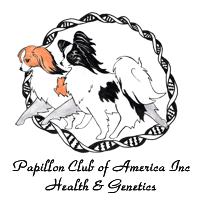
DEAR PCA MEMBERS
AND THE PAPILLON
COMMUNITY
October, 03. 2015
It is with great joy that I am able to announce that Dr. Giger’s University
of Pennsylvania research laboratory PennGen has established a Papillon
specific DNA test for neuroaxonal dystrophy (NAD). In Papillons, NAD is a
disorder of young puppies that is a rapidly progressing fatal neuropathy
characterized by ataxia and tremors. There is no treatment and affected
puppies have to be humanely euthanized by a few months of age. This autosomal recessively inherited brain disorder has been around for at least three decades and is widespread. NAD has been documented or is suspected in different parts of the world including United States, Japan, Australia and Europe, but the overall prevalence is not yet known.
It’s been a long and many times, heartbreaking journey where a diagnosis of NAD could only be reached by necropsy/autopsy. Parents and related dogs had to be considered obligate or suspected carriers but now, a DNA test is available to determine if a particular Papillon is an affected, carrier or clear dog. Most importantly, this test will not only identify the clear dogs, but will allow the informed breeding of a carrier to a clear dog. This will permit the preservation of the precious good genes and the broader gene pool within the Papillon breed.
The Papillon Club of America (PCA) has been working closely with Dr. Giger’s team and with owners and breeders to provide samples from affected and related dogs to further characterize NAD. In addition PCA has provided financial support to advance health of Papillons.
Dr. Giger and his PennGen laboratory have been developing and offering genetic tests for many different diseases in different dog and cat breeds over the past two and a half decades. Now, the PCA Genetics Committee is encouraging Papillon breeders to test their breeding Papillons for NAD.
Initially, Dr. Giger will only be able to offer the test for 400 Papillons as he has a smaller research laboratory with limited manpower. It should be noted that the laboratory will not release any specific information of test results of dogs other than to the owner/submitter, but will inform the Papillon breed club of the prevalence of the mutant allele if samples are sent to his laboratory.
The turn around time is 4 weeks from receiving samples. All submissions have to be done online at PennGen website by setting up an account and then submitting samples and required paperwork for each dog. This will be a cheek swab or EDTA blood sample DNA test which is simple and should be accurate. The test will be $100 and payment will be requested by email when results are available (with or without discount). Once payment has been requested, users will be able to pay online using a credit card and view the results.
Dr. Giger’s research could not have been completed without the owners and breeders who sent in samples from affected and related dogs. Those individuals will receive a letter from Andi Meloon, Chairman of PCA Genetic Committee whereby they will be offered a discount by Dr. Giger with the test fee of $75. This letter will have to be submitted to Dr. Giger along with the samples.
Testing will begin over the next few weeks and notice of the startup will be sent by email to the PCA membership, Facebook and also by sharing with Papillon Breed Clubs. The testing guidelines for collection and shipping will be provided in the next weeks. PCA will be setting up a webpage for the results that individuals submit for publication in the same format that is done for the PRA1 results. The PCA Genetics Committee will have a release form to be signed by the owners/breeders for publication of results. We really encourage the release of genetic information of breeding Papillons as we then can perform informed breedings.
The fear of this disease is nearly over assuming the Papillon breeders will embrace this screening test to perform informed breedings between carriers and clear/normals! Publication of carriers and normals will keep this breed’s gene pool healthy; no results will be released without the explicit agreement of the owner of the Papillon. Our courage to post all results will help those kennel clubs who do not accept carrier results for registration. We have to lead the way.
Also, please note that Dr. Giger has agreed to be the Guest Speaker at the 2016 PCA National.
Sincerely, Andi Meloon
PCA Genetics Chairman
While Papillons are generally a healthy breed, there are known genetic problems that affect
some individuals.
The goal of this Committee is to enlighten the breeding community and the general
public about the types of problems that can occur, in the hopes we can all work
together to reduce their incidence.
PCA Health & Genetic Committee
